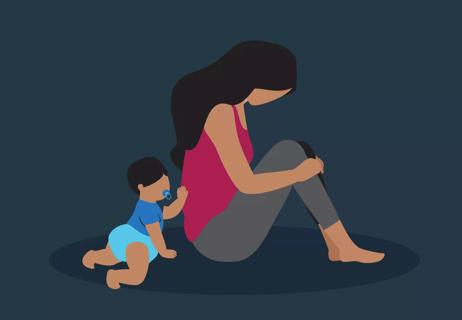What to know, and when to seek help

The frequent night feedings. The fussing that seemingly can’t be soothed. The rearranging of your days to tend to the constant needs of a brand new baby. It can all catch up to any new parent.
Cleveland Clinic is a non-profit academic medical center. Advertising on our site helps support our mission. We do not endorse non-Cleveland Clinic products or services. Policy
While we typically associate the “baby blues” and postpartum depression with women, new fathers can experience serious mood changes after bringing baby home, too.
In fact, paternal postnatal depression is “wildly common,” says psychologist Scott Bea, PsyD. About 10% of fathers become depressed before or just after their baby is born, according to research published in the Journal of the American Medical Association.
Postpartum blues are especially common three to six months after the birth, with as many as one in four dads experiencing symptoms.
The reason is partly biological, Dr. Bea says. “Everyone knows that mothers’ hormones change a lot during and after pregnancy. But there’s evidence that fathers also experience real changes in their hormone levels after a baby is born,” he explains.
And plenty of non-hormonal factors are at play, too:
Symptoms of depression can look different in men and women. Some of the more common signs in men include:
Men who have a history of depression might be at greater risk of postpartum depression. So are new fathers whose partners also have postpartum symptoms.
Unfortunately, many men laugh off the idea of paternal postpartum depression. And even if they accept it’s the real deal, they might not admit it’s affecting them.
“But there’s nothing shameful about postpartum depression,” Dr. Bea stresses. “Fatherhood is a huge new job, with long hours and no pay, and society doesn’t do a good enough job supporting men in this role.”
To maintain a positive mood when you’re in the thick of new fatherhood, Dr. Bea recommends focusing on the self-care basics:
Adjusting to a new baby takes time. It’s normal for your mood to be a little rocky in the process. But if your symptoms last more than two to three weeks, consider help from a counselor or psychotherapist.
“Asking for help doesn’t mean you’re helpless,” Dr. Bea points out. It means you’re doing what you need to do so you can be the best partner — and best dad — you can be.
Learn more about our editorial process.

Heavy bleeding, pain and persistent sadness could be something more serious

Sad feelings and teariness that persist are a sign

It's the first medicine approved for this use

This coping mechanism can help you prepare and think through an impending loss

Enter relaxation mode by managing your breathing, releasing muscle tension and practicing mindfulness

The hallucinogenic brew has cultural and religious significance for some communities in the Amazon basin

While social media content doesn’t create eating disorders, it can easily exacerbate them

Thunder, waterfalls and heavy rain — these low-frequency sounds might help cancel out disruptive noises and thoughts

Your metabolism may torch 1,300 to 2,000 calories daily with no activity

A gentle touch in all the right places may help drain your sinuses